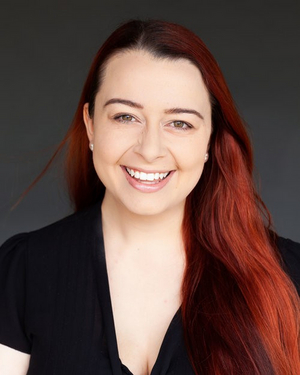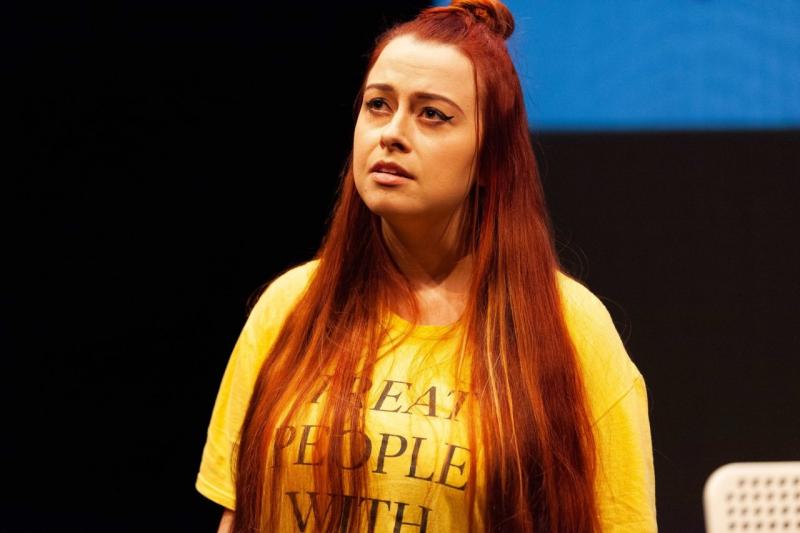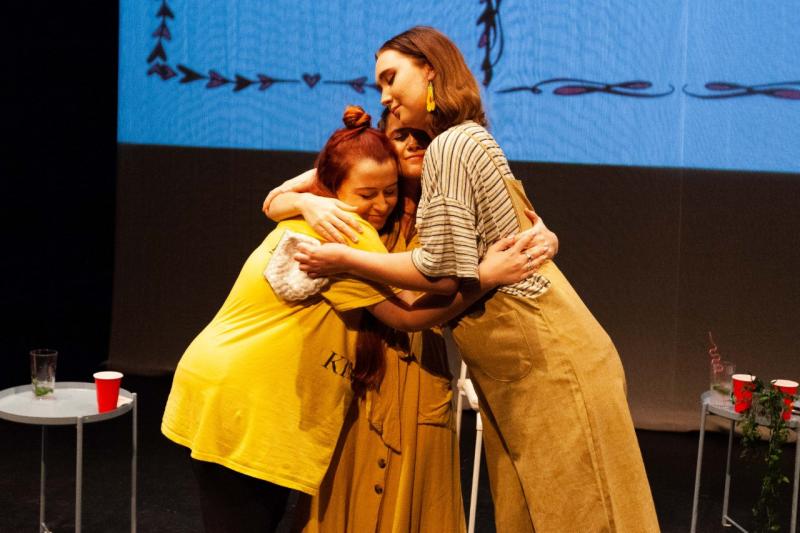 Next up on my Local Artists segment is one of the most hard-working, kindest and one of the most passionate humans you'll ever meet... performer, theatremaker, writer and access consultant, Madeleine Little. Since 2015, Madeleine has been a member of the Indelabilityarts Ensemble, co-devising Love Me; (2017) and co-devising and performing in Look Mum... No Hands! [The Legless Bar Years] (2016-2018). Among other credits, Madeleine performed in Restless Dance Theatre's Helpmann-nominated work Intimate Space on the Gold Coast (2018) at bleach* Festival in association with Festival 2018. Her original work, Hold, was presented in April 2019 as part of her Master of Arts (Creative Arts) research at USQ testing the implementation of accessible theatre practice conventions in a new work. She worked as a Research Associate for The Last Avant Garde - Disability and the Performing Arts in Australia: Beyond the Social Model research project (UniMelb, UniSyd, AAV, ARC lastavantgarde.com.au). Madeleine was also awarded the inaugural Stella Young Award from Arts Access Victoria (2018) and the inaugural National Leadership Award from Arts Access Australia (2019). Here's what Maddie had to say...
Next up on my Local Artists segment is one of the most hard-working, kindest and one of the most passionate humans you'll ever meet... performer, theatremaker, writer and access consultant, Madeleine Little. Since 2015, Madeleine has been a member of the Indelabilityarts Ensemble, co-devising Love Me; (2017) and co-devising and performing in Look Mum... No Hands! [The Legless Bar Years] (2016-2018). Among other credits, Madeleine performed in Restless Dance Theatre's Helpmann-nominated work Intimate Space on the Gold Coast (2018) at bleach* Festival in association with Festival 2018. Her original work, Hold, was presented in April 2019 as part of her Master of Arts (Creative Arts) research at USQ testing the implementation of accessible theatre practice conventions in a new work. She worked as a Research Associate for The Last Avant Garde - Disability and the Performing Arts in Australia: Beyond the Social Model research project (UniMelb, UniSyd, AAV, ARC lastavantgarde.com.au). Madeleine was also awarded the inaugural Stella Young Award from Arts Access Victoria (2018) and the inaugural National Leadership Award from Arts Access Australia (2019). Here's what Maddie had to say...
VIRAG: How did you become involved in the Australian arts sector?
MADDIE: I've always been involved in the arts, thanks to music and drama through schooling. I desperately wanted to be the next Hilary Duff when I was a kid, and I think that filtered through to a love of performing and storytelling. My grandfather supported me through piano lessons in primary school, and I've always been invested in music and songwriting, but studying a Bachelor of Fine Arts (Drama) at Queensland University of Technology really solidified my love for theatre and live performance. Even though a few people - actors in the industry and university tutors - discouraged me from pursuing acting on the basis of disability, I got involved with the student theatre company, Vena Cava Productions, and from there I became an indelabilityarts ensemble member when the company began in 2015. I've been writing and performing ever since, and that carried through to my Master of Arts (Creative Arts) studies at University of Southern Queensland. I'm extremely passionate about art being for everyone, and that includes disabled artists.
Through my Masters, I've been researching accessible theatre practice and the aesthetics of access, which included producing an original work, 'Hold' (2019). I've also been fortunate in that the wonderful Kath Duncan invited me to join The Last Avant Garde research project, which was all about disability and the performing arts in Australia (lastavantgarde.com.au).
Over the years, I've been lucky enough to receive the inaugural Stella Young Award (2018) from Arts Access Victoria, an Access Arts Qld Achievement Award Special Mention (2019) and the inaugural Arts Access Australia National Leadership Award (2019). I've been very fortunate for the incredible opportunities I've had so far, and my hope is that I'm able to continue in accessible theatre practice and access consultancy in the performing arts. Though, my true love will always be performing, so here's hoping I can be on a stage again soon.
VIRAG: How has the coronavirus impacted your own creative practice?
MADDIE: I had a few performance opportunities lined up, and a few creative developments in the works. Some were just ideas that had been lingering, but others were collaborations with some fantastic artists.
While some have been cancelled or indefinitely postponed (particularly performance-based outcomes), I am fortunate in that I have been able to continue writing a new work with two of my fellow indelabilityarts ensemble members through FaceTime, and the indelabilityarts team have been working on something, too.
I also watched my casual box office work disappear, and there was a period of restlessness and anxiety surrounding income. I'm so grateful that my employer is able to access JobKeeper for us, which has alleviated much of the income-related anxiety. That said, I do still fear the adjustment period after Covid-19 and what that looks like for us as arts workers, but also as artists.
That said, I'm also very fortunate in that the National Leadership Award activities include Auslan lessons and some online courses, so I've been able to continue my professional development via online formats.
VIRAG: I've discussed with previous interviewees how heart-wrenching it is that so many artists, like yourself, and theatre companies have had to cancel their 2020 seasons and/or postpone their productions. For those that are reading this that may not work in or have much knowledge of the personal and deeply profound connections we artists have to our work, would you be able to provide some insight into what it feels like to have one of your productions, whether it be a debut work or an adaptation, cancelled?
MADDIE: It's a kick in the guts, quite honestly. To invest so much of yourself in a creative work, eager to share it with people, and to have that taken away? It's brutal. I'd liken it to being deeply committed to a sourdough starter. You've spent days, weeks, potentially months feeding it, bit by bit, and then all of a sudden, someone comes in and steals the jar from you. They say, 'we don't know if you'll get it back, but it's gone for now'. That uncertainty just lingers. Perhaps it's preposterous to liken it to making food, but in terms of the time investment and the care and concern that goes into getting things just right, and having that ripped away? I think it's not too far off. I keep thinking about the magic of my show, all of the incredible feedback from the audience about how it resonated with them, and how rewarding it would have been to improve upon that story, make it better, share it with an audience and let the magic happen. I'm devastated that for now, it has to stay on the page.
That said, I also think my experience as a disabled artist makes it an even more complex issue. I was essentially self-isolating rather early on, and did so for six weeks. Only now that Qld's restrictions have eased have I started seeing people, albeit only very close friends whom I trust.
It was difficult to be simultaneously furious and devastated that my work had disappeared, but to also completely understand why. Disabled people are at a higher risk, and I had to acknowledge that for myself and many of my colleagues and collaborators, we needed to be even more conscious of the risks and social distancing measures. I think throughout the pandemic, I've been sitting with feeling a sense of grief and loss for the creative projects, but also with a more important goal of keeping myself and my loved ones, friends and collaborators safe and well. That's not to say it minimises the grief, but it does provide more perspective.
VIRAG: Is there any advice that you could give to those that are grieving the cancellation of a production?
MADDIE: Allow yourself to feel and process the grief. Those feelings are valid. It might help to revisit the script or text to stay connected, or it might help to busy yourself with other things. If you can, reach out to some fellow artists who are experiencing the same thing. I've found a lot of comfort in chatting to peers about our projects and it doesn't remove or fix the hurt, but it does make it easier to carry until we heal.
VIRAG: Lastly, have you been able to stay creative and keep generating and refining ideas while you've been in self-isolation? Or have you found it difficult to stay creative during these overwhelming times?
MADDIE: Yes and no... the problem with living through a pandemic is that it is, quite literally, a traumatic experience. We are all living through and coming out of a trauma. It has been really quite difficult to maintain some sense of hope or optimism enough to push through and keep creating. I think it's also been really difficult dealing with the expectation of productivity; I'm disabled. I'm going to work in a much different way to my abled peers. The internet has done a great job of telling us all that there is 'no excuse' not to be productive, but the mental exhaustion and emotional upheaval that we've all experienced is definitely a valid excuse. We don't owe anyone anything other than our commitment to do what we can, so I really think we need to remove any guilt associated with not being as creative as others might be.
That said, I've continued with a creative development once a week over FaceTime, and have been working on something with indelabilityarts. If anything, though, I've gone back to music and songwriting as a hobby and emotional release. I've needed to seek art as a means of comfort, rather than work. The more I am creative just for me, the more I feel I'm healing and moving towards being able to create, perform and produce theatre again. I look forward to that day when it comes, I really do.
Photography by Nick Morrissey
Comments
To post a comment, you must
register and
login.
 Next up on my Local Artists segment is one of the most hard-working, kindest and one of the most passionate humans you'll ever meet... performer, theatremaker, writer and access consultant, Madeleine Little. Since 2015, Madeleine has been a member of the Indelabilityarts Ensemble, co-devising Love Me; (2017) and co-devising and performing in Look Mum... No Hands! [The Legless Bar Years] (2016-2018). Among other credits, Madeleine performed in Restless Dance Theatre's Helpmann-nominated work Intimate Space on the Gold Coast (2018) at bleach* Festival in association with Festival 2018. Her original work, Hold, was presented in April 2019 as part of her Master of Arts (Creative Arts) research at USQ testing the implementation of accessible theatre practice conventions in a new work. She worked as a Research Associate for The Last Avant Garde - Disability and the Performing Arts in Australia: Beyond the Social Model research project (UniMelb, UniSyd, AAV, ARC lastavantgarde.com.au). Madeleine was also awarded the inaugural Stella Young Award from Arts Access Victoria (2018) and the inaugural National Leadership Award from Arts Access Australia (2019). Here's what Maddie had to say...
Next up on my Local Artists segment is one of the most hard-working, kindest and one of the most passionate humans you'll ever meet... performer, theatremaker, writer and access consultant, Madeleine Little. Since 2015, Madeleine has been a member of the Indelabilityarts Ensemble, co-devising Love Me; (2017) and co-devising and performing in Look Mum... No Hands! [The Legless Bar Years] (2016-2018). Among other credits, Madeleine performed in Restless Dance Theatre's Helpmann-nominated work Intimate Space on the Gold Coast (2018) at bleach* Festival in association with Festival 2018. Her original work, Hold, was presented in April 2019 as part of her Master of Arts (Creative Arts) research at USQ testing the implementation of accessible theatre practice conventions in a new work. She worked as a Research Associate for The Last Avant Garde - Disability and the Performing Arts in Australia: Beyond the Social Model research project (UniMelb, UniSyd, AAV, ARC lastavantgarde.com.au). Madeleine was also awarded the inaugural Stella Young Award from Arts Access Victoria (2018) and the inaugural National Leadership Award from Arts Access Australia (2019). Here's what Maddie had to say...
.jpg)


